

INEX 2009 Wikipedia collection DOMSERVLET (Sustainability accounting) Category:Sustainability. From Wikipedia, the free encyclopedia Subcategories This category has the following 33 subcategories, out of 33 total.
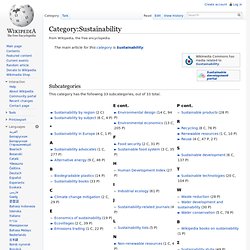
Pages in category "Sustainability" The following 200 pages are in this category, out of 224 total. This list may not reflect recent changes (learn more). (previous 200) (next 200)(previous 200) (next 200) Category:Environmental education. Environmental education. Environmental education (EE) refers to organized efforts to teach about how natural environments function and, particularly, how human beings can manage their behavior and ecosystems in order to live sustainably.
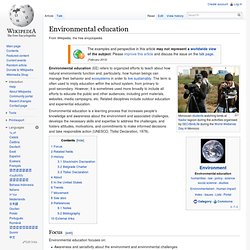
The term is often used to imply education within the school system, from primary to post-secondary. However, it is sometimes used more broadly to include all efforts to educate the public and other audiences, including print materials, websites, media campaigns, etc. Related disciplines include outdoor education and experiential education. Environmental education is a learning process that increases people's knowledge and awareness about the environment and associated challenges, develops the necessary skills and expertise to address the challenges, and fosters attitudes, motivations, and commitments to make informed decisions and take responsible action (UNESCO, Tbilisi Declaration, 1978). Focus[edit] Environmental education focuses on: Related fields[edit] Portal:Sustainable development. Sustainability.
Achieving sustainability will enable the Earth to continue supporting human life.
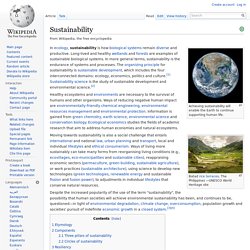
In ecology, sustainability is how biological systems remain diverse and productive. Long-lived and healthy wetlands and forests are examples of sustainable biological systems. In more general terms, sustainability is the endurance of systems and processes. The organizing principle for sustainability is sustainable development, which includes the four interconnected domains: ecology, economics, politics and culture.[1] Sustainability science is the study of sustainable development and environmental science.[2] Healthy ecosystems and environments are necessary to the survival of humans and other organisms. Etymology[edit] The name sustainability is derived from the Latin sustinere (tenere, to hold; sub, up).
Components[edit] Three pillars of sustainability[edit] Circles of sustainability[edit] Resiliency[edit] History[edit] Principles and concepts[edit] Scale and context[edit] Consumption[edit] Measurement[edit] 1. Education for Sustainable Development. Sustainability education (ES), Education for Sustainability (EfS), and Education for Sustainable Development (ESD) are interchangeable terms describing the practice of teaching for sustainability.
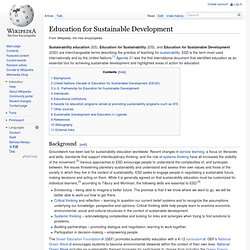
ESD is the term most used internationally and by the United Nations.[1] Agenda 21 was the first international document that identified education as an essential tool for achieving sustainable development and highlighted areas of action for education. Background[edit] Groundwork has been laid for sustainability education worldwide. Envisioning – being able to imagine a better future. The premise is that if we know where we want to go, we will be better able to work out how to get there.Critical thinking and reflection – learning to question our current belief systems and to recognize the assumptions underlying our knowledge, perspective and opinions. The Green Education Foundation (GEF) promotes sustainability education with a K-12 curriculum.
The objectives of the DESD are to: U.S. The U.S. Introduction. What is Wikipedia?
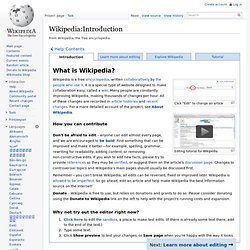
Click "Edit" to change an article Editing tutorial for Wikipedia Wikipedia is a free encyclopedia, written collaboratively by the people who use it. It is a special type of website designed to make collaboration easy, called a wiki. Many people are constantly improving Wikipedia, making thousands of changes per hour. How you can contribute Don't be afraid to edit – anyone can edit almost every page, and we are encouraged to be bold!